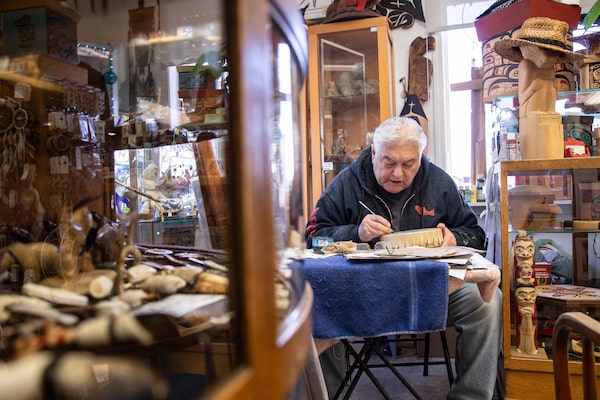Good morning,
In the largest anti-government demonstration since Israel went to war in October, tens of thousands of Israelis gathered outside the parliament building in Jerusalem to urge the government to reach a deal to free dozens of hostages held by Hamas in Gaza and to hold early elections.
Nearly six months of war have renewed divisions in Israeli society. The Hamas militant group killed some 1,200 people during its cross-border attack on Oct. 7, and took 250 others hostage. Roughly half the hostages were released during a week-long ceasefire in November, but repeated attempts by international mediators to broker another ceasefire deal have failed.
Prime Minister Benjamin Netanyahu has vowed to destroy Hamas and bring all the hostages home. But those goals have been elusive. While Hamas has suffered heavy losses, it remains intact, and hostages’ families believe time is running out.

A woman holds up a sign with images of hostages held captive by Hamas in the Gaza Strip as she attends a rally calling for their release in Tel Aviv, Israel, March 30, 2024.Maya Alleruzzo/The Associated Press
This is the daily Morning Update newsletter. If you’re reading this on the web, or it was forwarded to you from someone else, you can sign up for Morning Update and more than 20 other Globe newsletters on our newsletter sign-up page.
Doctors seek novel remedies as ERs across Canada become refuge for homeless
For years, homeless patients have been pejoratively labelled “frequent flyers” – accused of tying up the health care system with unnecessary and gratuitous visits. But as homelessness rates increase across the country – exacerbated by a mental health and addictions crisis – ERs have become almost an inevitable destination for Canada’s most vulnerable.
Fearing where things are headed, a chorus of doctors are calling for radical change: making the case, to whomever will hear them, that safe, affordable, secure housing is the best prescription for their patients.
Alternative community health care supports have long existed at the grassroots level. But now, physicians and hospitals are also beginning to look for ways to address the root social causes of their patients’ illnesses and injuries. Some are setting up satellite services outside of the health care facilities to provide care near shelters, parks and tent encampments. Others are going so far as to provide housing itself.
Dr. Louis Hugo Francescutti pictured at the Royal Alexander Hospital in Edmonton Alberta, March 6, 2024.JASON FRANSON/The Globe and Mail
In Alaska, a crackdown on Philippines-made ‘Indigenous’ art points to tougher enforcement of cultural laws
Indigenous art sales in southeastern Alaska total tens of millions of dollars a year, but knockoffs are way more widespread than your typical white-collar offence, with sellers making thousands of dollars on pieces sculpted in the Philippines, roughly 10,000 kilometres away.
That’s why the arrest of the family accused of misrepresenting the sale of Indigenous-made goods, a violation of the U.S. Indian Arts and Crafts Act, marks a milestone in the prosecution of a crime that, for many decades, has had little enforcement. It comes at a moment when Indigenous groups in the United States are taking new interest in enforcing artistic traditions they see as their intellectual property, with lucrative potential.

Ken Decker, a Tsimshian carver who owns the Crazy Wolf Studio in Ketchikan, Alaska, paints a drum on March 21, 2024.Nathan VanderKlippe/The Globe and Mail
Got a news tip that you’d like us to look into? E-mail us at tips@globeandmail.com Need to share documents securely? Reach out via SecureDrop
Also on our radar
A different kind of steam engine: How CPKC is aiming to decarbonize its fleet with hydrogen locomotives: If you’re used to watching freight trains click by in Western Canada, a hydrogen fuel cell locomotive wouldn’t immediately stand out. It looks the same. It moves the same. It’s still steel wheels on steel rails.
Twig Fertility aims to close the gaps in care for Canadians trying to conceive: Two years after opening their first clinic in midtown Toronto and a year after venture-capital fund Rhino Ventures invested $8-million to back a national expansion, Twig is set to open a clinic in downtown Toronto in coming weeks and launch a Vancouver clinic early next year.
Inspired by other women in law, Breanna Needham launches her own firm to serve smaller companies: Commercial litigator Breanna Needham, who made headlines four years ago for successfully shaming the Law Society of Ontario into converting its gigantic men-only robing room at Osgoode Hall into a gender-neutral space, is going out on her own.
Morning markets
Chinese shares led a rally in most of Asia amid a broadly optimistic global economic backdrop, but Japan’s Nikkei tumbled 1.4 per cent with the yen pinned near levels that have traders on guard for a currency intervention.
U.S. stock futures pointed firmly higher following a market holiday on Friday, when the Federal Reserve released data showing its preferred inflation measure indicated price pressures are further easing, bolstering bets for a June interest rate cut.
Many markets including those in Hong Kong, Britain and the eurozone are closed for Easter holidays.
The dollar traded at 73.86 U.S. cents.
What everyone’s talking about
We need a new labour framework for gig workers
“The core issue at play is that these workers are considered independent businesses, in contract with ride-hailing companies to provide their service, as opposed to employees. As a result, key labour regulations, such as entitlement to a minimum wage, unionization, sick leave and other workplace protections, do not apply to them.” – Viet Vu
Why Russia’s economy is doing so well – even if the good times won’t likely last
“If Russia seems to have won its battle with the West, the future of its war still looks in doubt. Although it’s finding markets for its exports, the discounts it’s being forced to absorb mean that its revenues are less than they would otherwise be. All the while it is growing ever more dependent on trading partners, such as China and India, which aren’t doing it any favours. Beyond defence, Russia’s manufacturing and high-tech sectors, which it wanted to develop, are struggling. As a result, Russia is turning back into a Third World country.” – John Rapley
Today’s editorial cartoon

David Parkins/The Globe and Mail
Living better
The art of fashion: Canada’s Best Dressed List of 2024
Head-to-toe black is the art world’s default uniform. But as the 2024 edition of The Globe and Mail’s annual Canada’s Best Dressed List captures, this country’s artistic community favours a more expressive palette.
Moment in time: April 1, 2011
From the Archives: Reporters prank Jack Layton’s mustache
Reporters on NDP Leader Jack Layton's campaign tour sport paper moustaches as an April Fool's joke during a campaign announcement in Sudbury on April 1, 2011.Andrew Vaughan/The Canadian Press
For more than 100 years, photographers and photo editors working for The Globe and Mail have preserved an extraordinary collection of news photography. Every Monday, The Globe features one of these images. This month, we’re showcasing hoaxes.
The biggest April Fools’ jokes – pranks or canards that seem plausible enough to be true – are spread by the media. In 1957, the BBC showed footage of Swiss spaghetti farmers harvesting pasta from trees. In another year, the BBC said Big Ben was being switched to digital. In 1992, NPR said former U.S. president Richard Nixon was re-entering the political arena, ready to be “kicked around” again. In 2008, the British Sun newspaper said French president Nicolas Sarkozy would have “pioneering stretch surgery” to boost his height by five inches so he could be taller than his wife, model Carla Bruni. And on April 1, 2011, above, Canadian journalists all donned paper moustaches while interviewing NDP leader Jack Layton during the federal election campaign. Mr. Layton, whose trademark ‘stash was his visual calling card, enjoyed the fun mocking. And the NDP had the last laugh – in the election, it became Parliament’s Official Opposition with the most seats in the party’s history. Philip King.
Enjoy today's horoscopes. Solve today's puzzles. Read today's Letters to the Editor.
If you’d like to receive this newsletter by e-mail every weekday morning, go here to sign up. If you have any feedback, send us a note.